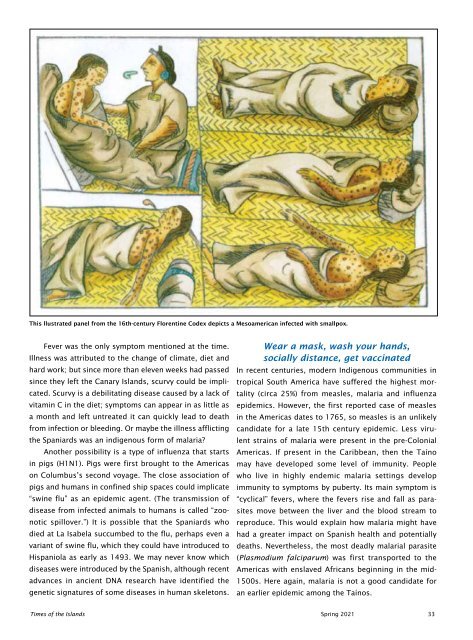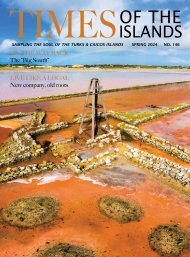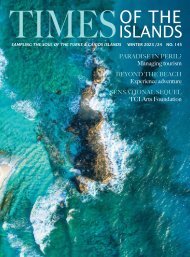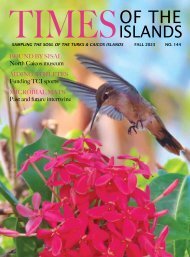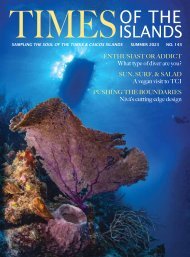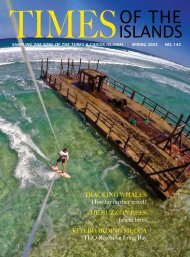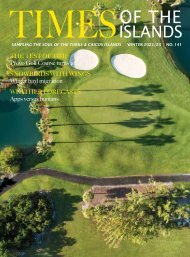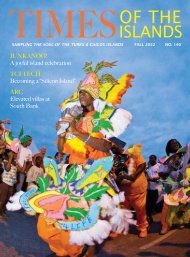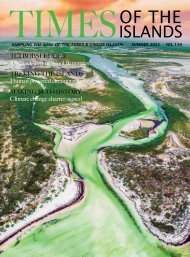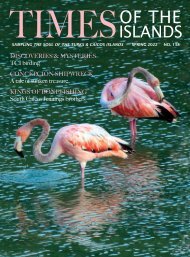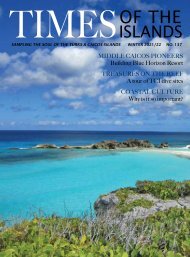Times of the Islands Spring 2021
Presents the "soul of the Turks & Caicos Islands" with in-depth features about local people, culture, history, environment, real estate, businesses, resorts, restaurants and activities.
Presents the "soul of the Turks & Caicos Islands" with in-depth features about local people, culture, history, environment, real estate, businesses, resorts, restaurants and activities.
You also want an ePaper? Increase the reach of your titles
YUMPU automatically turns print PDFs into web optimized ePapers that Google loves.
This llustrated panel from <strong>the</strong> 16th-century Florentine Codex depicts a Mesoamerican infected with smallpox.<br />
Fever was <strong>the</strong> only symptom mentioned at <strong>the</strong> time.<br />
Illness was attributed to <strong>the</strong> change <strong>of</strong> climate, diet and<br />
hard work; but since more than eleven weeks had passed<br />
since <strong>the</strong>y left <strong>the</strong> Canary <strong>Islands</strong>, scurvy could be implicated.<br />
Scurvy is a debilitating disease caused by a lack <strong>of</strong><br />
vitamin C in <strong>the</strong> diet; symptoms can appear in as little as<br />
a month and left untreated it can quickly lead to death<br />
from infection or bleeding. Or maybe <strong>the</strong> illness afflicting<br />
<strong>the</strong> Spaniards was an indigenous form <strong>of</strong> malaria?<br />
Ano<strong>the</strong>r possibility is a type <strong>of</strong> influenza that starts<br />
in pigs (H1N1). Pigs were first brought to <strong>the</strong> Americas<br />
on Columbus’s second voyage. The close association <strong>of</strong><br />
pigs and humans in confined ship spaces could implicate<br />
“swine flu” as an epidemic agent. (The transmission <strong>of</strong><br />
disease from infected animals to humans is called “zoonotic<br />
spillover.”) It is possible that <strong>the</strong> Spaniards who<br />
died at La Isabela succumbed to <strong>the</strong> flu, perhaps even a<br />
variant <strong>of</strong> swine flu, which <strong>the</strong>y could have introduced to<br />
Hispaniola as early as 1493. We may never know which<br />
diseases were introduced by <strong>the</strong> Spanish, although recent<br />
advances in ancient DNA research have identified <strong>the</strong><br />
genetic signatures <strong>of</strong> some diseases in human skeletons.<br />
Wear a mask, wash your hands,<br />
socially distance, get vaccinated<br />
In recent centuries, modern Indigenous communities in<br />
tropical South America have suffered <strong>the</strong> highest mortality<br />
(circa 25%) from measles, malaria and influenza<br />
epidemics. However, <strong>the</strong> first reported case <strong>of</strong> measles<br />
in <strong>the</strong> Americas dates to 1765, so measles is an unlikely<br />
candidate for a late 15th century epidemic. Less virulent<br />
strains <strong>of</strong> malaria were present in <strong>the</strong> pre-Colonial<br />
Americas. If present in <strong>the</strong> Caribbean, <strong>the</strong>n <strong>the</strong> Taíno<br />
may have developed some level <strong>of</strong> immunity. People<br />
who live in highly endemic malaria settings develop<br />
immunity to symptoms by puberty. Its main symptom is<br />
“cyclical” fevers, where <strong>the</strong> fevers rise and fall as parasites<br />
move between <strong>the</strong> liver and <strong>the</strong> blood stream to<br />
reproduce. This would explain how malaria might have<br />
had a greater impact on Spanish health and potentially<br />
deaths. Never<strong>the</strong>less, <strong>the</strong> most deadly malarial parasite<br />
(Plasmodium falciparum) was first transported to <strong>the</strong><br />
Americas with enslaved Africans beginning in <strong>the</strong> mid-<br />
1500s. Here again, malaria is not a good candidate for<br />
an earlier epidemic among <strong>the</strong> Taínos.<br />
<strong>Times</strong> <strong>of</strong> <strong>the</strong> <strong>Islands</strong> <strong>Spring</strong> <strong>2021</strong> 33


